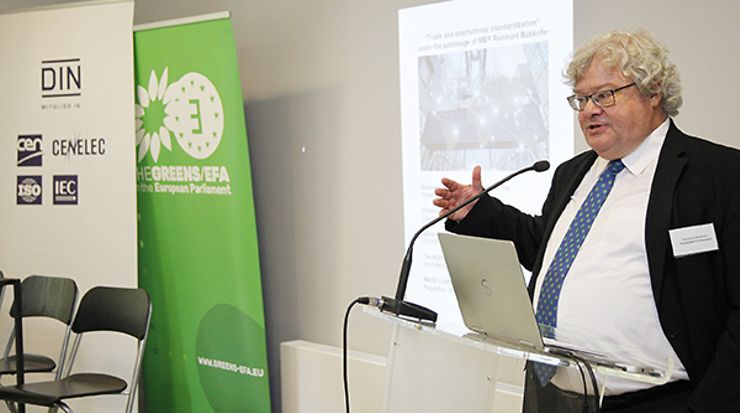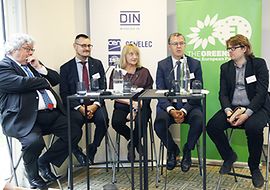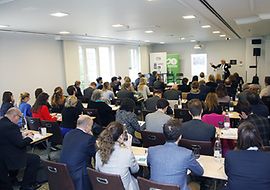MEP Reinhard Bütikofer stresses the importance of standardization
DIN event on "Trade and International Standardization" in Brussels

More than 60 stakeholders from the European Parliament, the European Commission, Permanent Representations and associations accepted DIN’s invitation to a discussion on “Trade and international standardization” on 9 October in Brussels. The event was held under the patronage of Reinhard Bütikofer, Member of the European Parliament (Greens/EFA).
In his opening statement, Mr. Bütikofer, who among other duties is Chair of the European Parliament’s Delegation for Relations with the People’s Republic of China, emphasized the essential role of standardization in the European Union's foreign trade policy. According to Bütikofer, other leading industrial nations such as China and the United States have recognized the importance of technical standards and are utilizing them as a strategic instrument. He referred to a newly published Report by the former Prime Minister of Sweden, Carl Bildt, on standardization for the global competitiveness of the EU in the digital age, a report for which Mr. Bütikofer provided advice: Standardization must be a part of a European industrial strategy. “Standardization is perhaps even more important than innovation itself,” stated the MEP. His call to establish a special representative for standardization at the European Commission was met with broad support in the panel discussion. This representative would report directly to the Executive Vice President-Designate of the Commission, Margrethe Vestager. Industry associations should join forces and push for this to happen.
Christoph Winterhalter, Chairman of the Executive Board of DIN, spoke in his role as Vice President Policy of CEN and head of the Task Force on China about his experiences in working with the Chinese standardizers. Europe is well-represented in an advisory body for the Chinese standards organization (SAC). Efforts are underway to make the Chinese more aware of the advantages of adopting international standards into the national body of standards as well as the goal of achieving a uniform, coherent and consistent body of standards. As part of the IEC General Assembly in Shanghai (21-25 October), both a strategy dialogue and a workshop on the European standardization system have been scheduled.
Dr. Tim Rühlig, Research Fellow with the Swedish Institute of International Affairs, provided further perspectives on the development of the Chinese standardization system. This is a system designed to strike a balance between the impetus of technological innovation and quality improvements by private companies on the one hand and state control by the Party on the other. According to Dr. Rühling, China will continue to carefully consider which elements of other standardization systems it adopts and will implement them only as long as they remain beneficial for Chinese objectives.
For the European Commission, the advantages of integrating national with European and international standards are beyond a doubt, said Silvia Vaccaro of the Directorate-General for Internal Market (DG GROW). When negotiating free trade agreements, the aim is to reference international standards and the provisions of the Agreement on Technical Barriers to Trade of the World Trade Organization (TBT Agreement).
Martin Löhe, in charge of digital regulation at Miele, presented the advantages of international standards for companies, including access to markets and cost reduction. For example, in countries such as China, Australia and New Zealand, test methods for household refrigerators are integrated into legislation, preventing further costs from being incurred for product tests. Löhe also touched upon a sore point with regard to the current structure of the public-private partnership between state regulation and standardization. The sluggish listing of harmonized standards in the Official Journal of the European Union as well as the failure to include the Cybersecurity Act in the New Legislative Framework are giving companies cause to worry. There is a risk that Europe will fall from its position as a standards setter to simply being a “standards taker”.


